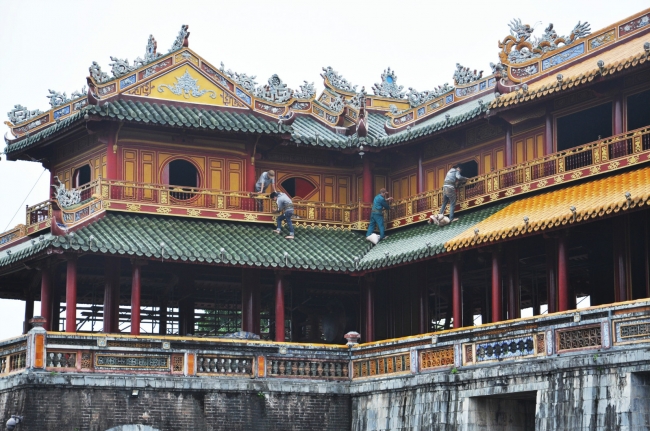| Fact Finding Mission in Vietnam, Sustainable Development Training |
| Author:Simone Ricca PublishDate:2019-01-23 Hits:1989 |
The Asia-Pacific region lacks of training programs in the sector of World Heritage designed not only for technical professionals, but also for local administrators and decision-makers. WHITRAP plans to develop, in close coordination with UNESCO Hanoi, capacity-building activities for Vietnamese properties inscribed on the World Heritage List, focusing on a specific site and involving all the concerned management levels.
The fact-finding mission to Vietnam — carried out between January 14th and 22nd by Simone Ricca, with Ms Huong Pham (UNESCO Hanoi) and Mr Peter Debrine (UNESCO WHC Sustainable Tourism Programme) — aimed to assess the situation in two Vietnamese World Heritage Properties: Trang An Landscape Complex (a mixed site) and the Complex of Hue Monuments (Cultural Site).
Located some 90 Km from the capital Hanoi, Trang An is visited by almost 3 million visitors/year and is famous for its waterways and caves. Currently however, the geological and archaeological elements defining the OUV of the property are not easily perceived by the public. The site management unit is now developing the property Management Plan.
The Citadel of Hue, the last imperial capital (Nguyen Dynasty 1802-1945), was heavily damaged during the wars in the 20th century, and some 10.000 people live within the WH site. The Hue Monuments Conservation Centre (HMCC), staffed by more than 700 people, manages the citadel. This institution deals with all the issues relevant for the site (zoning, research, preservation, restoration, visitor management, landscape…), but local team capacities in conservation, management and tourism could be reinforced to preserve and develop the site according to its OUV.
In the coming months, WHITRAP will identify the most suitable site for the training and begin defining the most relevant issues the course should address to meet local needs and expectations.
|
- News | WHITRAP Shanghai and CNR-ISPC bilateral meeting
- News | WHITRAP meets Cité de l’Architecture et du Patrimoine
- WHITRAP Hosting "Workshop on Preliminary Assessment for National Focal Points of the Asia Region" in Chengdu
- WHITRAP Shanghai meets UNESCO
- INTERNATIONAL CONFERENCE PRELIMINARY ANNOUNCEMENT & CALL FOR PAPERS
- Observation of the 46th Session of the World Heritage Committee
Copyright © 2009-2012 World Heritage Institute of Training and Research-Asia and Pacific (shanghai)



